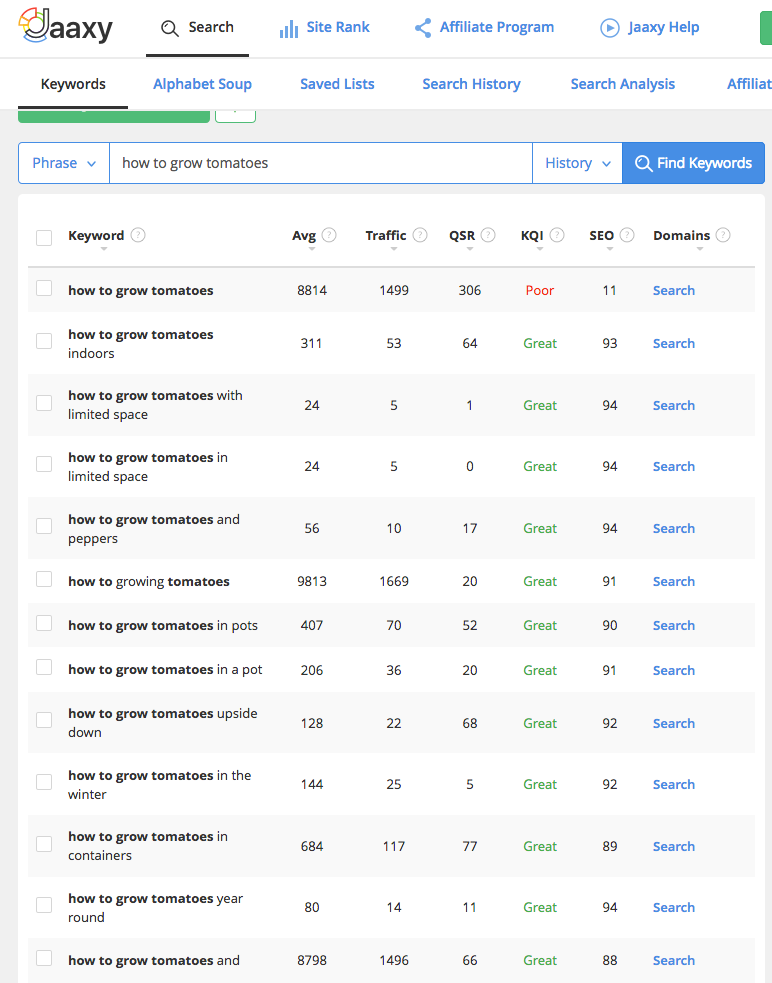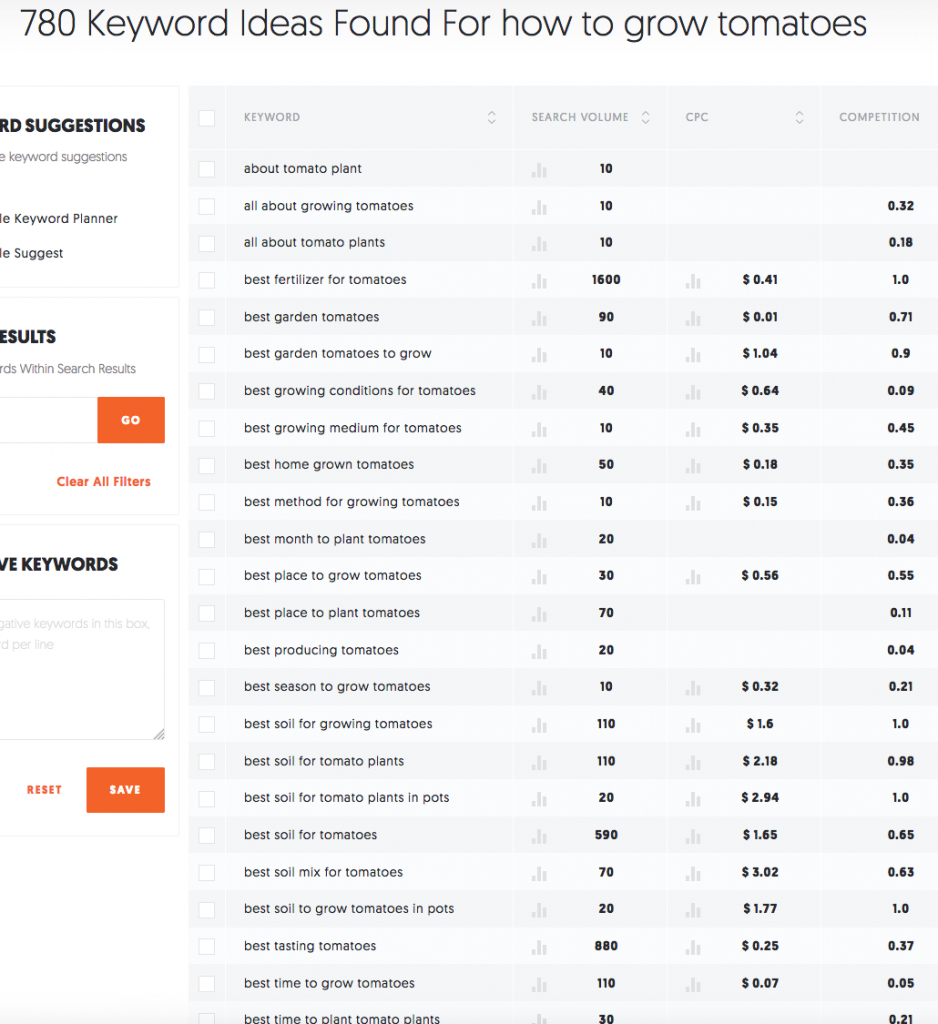The Death of Keywords

I really wish we didn’t have to worry about low competition keywords. I would also bet that Google wishes they didn’t have to worry about any keywords. I look forward to the day when the Google Search algorithm is smart enough to point searchers to the most relevant content even if it doesn’t contain any of the words used in the search.
It would be great to go to Google, type “I want to learn how to grow tomatoes”, and be taken to the most relevant content even if it doesn’t contain any of the exact phrases in the search.
Sadly, that day is still a way off. I do think Google is working toward it though. Each new search engine release seem to be getting closer. Maybe we are at the midpoint. We are way past the days when just stuffing as many high search volume phrases into a page as you could would get you high ranking but still far short of being able to say keywords don’t matter.
For now, I recommend writing your content for the people you have identified as your target audience and not worry about keywords as you write. Then, when you have a quality article or post, you can go back and work in a few good keywords – but only if they flow naturally in your existing writing.
Whatever you do, don’t try to write to please the search engine robots. Robots don’t buy the products you are selling – people do.
When you do start adding those key phrases I suggest you concentrate on targeting low competition keywords.
What Are Low Competition Keywords?
A low competition keyword is one that has some search volume but very few web pages including it.
Put simply we want to find keywords that a lot of people are typing into search engines but very few or no other sites are trying to rank for.
Searches vs Competition
There is a trade off between high search volume and competition. A phrase that is getting a lot of searches will quickly attract a lot of competition. How will you rank if there are thousands of websites targeting those high search, low competition keywords? Not very well, especially if you have a new site. Age of the post and website authority also factor into searches. That will make it harder for your new post to compete.
Take look at the “How to grow tomatoes” example:

So, what does this search for "how to grow tomatoes" tell us? The Avg column is the average number of search this keyword get each month. In this case it is 8814 and that is a high volume. If you managed to rank on the first page of Google for this search, the traffic column tells us you could expect 1499 page visits a month – just from this one keyword. But, the QSR (Quoted Search Results) column indicates 306 other sites are also targeting “how to grow tomatoes.”
That amount of competition is actually not horrible but you are probably not going to rank on the first page – maybe your well written article has a chance at the third or fourth page.
Looking down the list, “how to grow tomatoes in a pot” gets 206 searches each month but there are only 20 other pages targeting it! You have a much better chance of getting ranked if you target this keyword. I would rather to get a big piece of a small pie than get just a crumb from a large one. Besides “How to Grow Tomatoes in a Pot” is a better sounding post title.
By the way, make sure the keyword makes sense otherwise you wont be able to make it sound natural in you content. For example “how to growing tomatoes” has a high search volume at 9813 and low competition at 20. But, it isn't correct grammar. It isn't going to sound right in your content.
And here is another thing to keep in mind. When you target “how to grow tomatoes in a pot” you also do target the keyword “how to grow tomatoes” so you could get some hits for that too! If you write naturally about your topic. You will include many other keywords in your text. Even if most of them only attract 10 or fewer visits a month, the total traffic when you have many hundreds or thousands of keywords spread over many articles will mean substantial and constantly growing traffic.
Finding Low Competition Keywords
I used Jaaxy for the above keyword search. I like it because it it gives me all I want to know on a single page. But, the free version has limitations and the Pro version costs money. Still, you should give it a test drive. You will get 30 free searches with the free version so you can put the program through it’s paces. If you find it fits with your way of working, you can upgrade to Pro or Enterprise. Jaaxy also includes other tools for finding domain names related to keywords, finding affiliate programs, finding your site ranking for a given keyword and more that I don’t have space for here. Jaaxy Lite is included in the Wealthy Affiliate Starter Membership.
You can try a free Jaaxy search right from this page:
For a free keyword search tool, you can go straight to the source and use the Google Keyword Planner. It is harder to use but it will get you the info you need.
Another very handy website for coming up with keywords is UberSuggest. This free online tool produces a lot of keyword suggestions that you can further research using Jaaxy or Google. Here is a small sample of what it found for “how to grow tomatoes”:

Google Search is another easy way to get keyword ideas. In particular you can use Google Instant to generate ideas. Click Here for a short video that will explain this” Alphabet Soup” technique.
How long is your tail?
Adding words before or after a basic keyword to make it a lower competition phrase make it a long tail keyword. If “grow tomatoes” is the basic search keyword, then “how to grow tomatoes” is a long tail keyword and “how to grow tomatoes in a pot” is an even longer tail keyword.
In general, the longer the tail the easier it will be to rank and the lower the search volume will be. There are exceptions though. If you find a longer tail keyword with more searches than shorter tail ones you should probably jump on it.
Read marketing guru Neil Patel ‘s blog that gives some great examples of using long tailed keywords here.
Quality of competition
Once you find a few low competition keywords you think you can use, you should evaluate the quality of the competition for each.
I put the quality into 4 levels. The highest is paid ads. If someones pays Google to promote a keyword, they will go to the top of the list. You can identify these because they have the word Ad in a yellow box in front of the listing. Unless you want to pay more for each impression of the keyword, you are not going to outrank those sites.
Pay per click and pay per impression are a whole different ball game than what this post is about. Until you are generating enough revenue to be able to support a paid campaign, I would not even consider trying it. It can get very expensive and requires some special knowledge to participate. Save it for down the road.
eCommerce sites are the second level. They will almost always outrank affiliate sites. For example, a search for “tomato cages” shows sites like Home Depot, Lowes and Amazon at the top. Not much you can do about this one either. Just be aware that if there are a lot of eCommerce websites on the first page of results it will be harder for you to crack it.
Then there are other affiliate sites. How you compete against these depends a lot on the quality of your content. Click on a few of the other affiliate pages and see how you compare. If they are just stuffing keywords into low quality content, you have a good chance to outrank them. Go ahead and post your page then monitor your ranking. If you are not moving up you should tweak your post to make it more competitive. Just don’t sacrifice quality.
Finally there are forum posts, question and answer sites and other casual mention of the keyword. You high quality work should easily outrank there pages.
This post is getting long so I am going to hold off on talking about ways to work low competition keywords into your title and content until the next post.
In the mean time, what are your thoughts on targeting low competition keywords? Questions and comments are very welcome.

